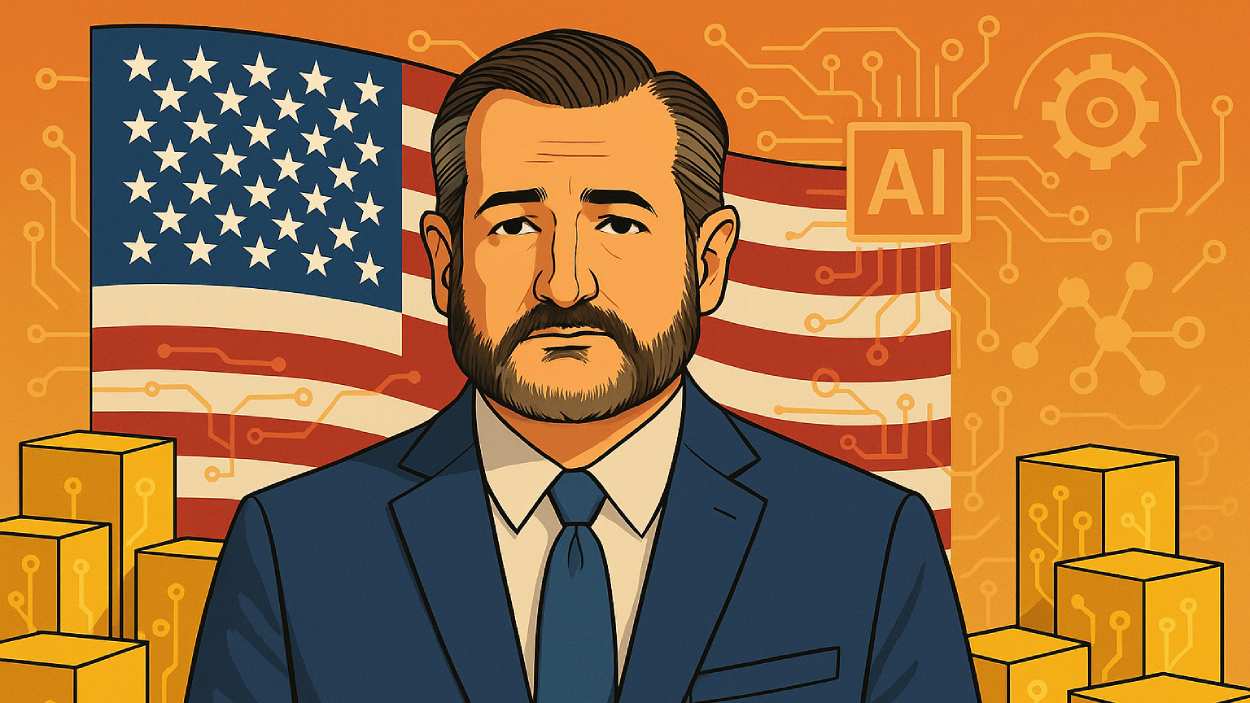Senator Ted Cruz has introduced a bold new AI legislation that aims to ease regulations and keep the United States ahead in the global tech race.
Quick Summary – TLDR:
- Cruz’s AI Sandbox Bill allows companies to apply for temporary exemptions from federal regulations.
- The program seeks to eliminate regulatory roadblocks to support AI innovation and compete with China.
- It includes a federally managed application system and will operate for up to 12 years.
- Cruz stresses this is not a free pass but a controlled environment for innovation with legal oversight.
What Happened?
Senator Ted Cruz, who chairs the Senate Commerce Committee, has introduced a new bill aimed at creating a regulatory sandbox for artificial intelligence. This initiative would allow AI developers to request temporary exemptions from federal rules, with the goal of promoting innovation and giving the United States a competitive edge against global rivals like China.
Cruz presented the bill during a hearing and in an interview on CNBC, calling it a strategic move to replicate the internet boom of the 1990s by reducing bureaucracy and unleashing entrepreneurial energy.
Cruz’s AI Sandbox: The Key Details
The proposed bill sets up a federally managed AI sandbox that allows companies to apply for waivers through the White House Office of Science and Technology Policy. These waivers would offer two-year exemptions from certain federal regulations, with the possibility of renewals for up to 10 more years, before the sandbox program phases out entirely after 12 years.
Cruz stressed the sandbox is not a deregulation free-for-all. “A regulatory sandbox is not a free pass,” he told the subcommittee. Developers will still have to follow existing laws, including consumer protection, copyright, contracts, and privacy regulations.
Why Cruz Says This Matters?
Cruz sees the AI race as a national security and economic issue, not just a tech concern. He warned that China’s state-backed push to dominate AI by 2030 is a direct challenge to American leadership. “The question of who wins the race for AI is going to determine who prospers and who loses in the coming decades,” he said.
Citing how the UK used AI to triple stroke treatment success rates, Cruz argued that innovation-friendly policies can directly improve lives. But in the U.S., stringent HIPAA rules are stalling similar health tech breakthroughs.
Industry Reaction and Legislative Path
Major tech firms including OpenAI, Meta, Google, and Amazon have supported moves to reduce regulatory burdens. Cruz’s sandbox would give them room to test AI systems responsibly while still protecting consumers.
The bill also builds on the Trump administration’s AI Action Plan, which the Cruz team hopes to codify into law. His proposed framework includes five guiding principles:
- Encourage innovation
- Create national AI rules
- Stop AI misuse like fraud
- Preserve free speech
- Handle ethical issues
Despite prior setbacks such as the Senate’s 99-1 rejection of a proposed 10-year ban on state AI laws, Cruz’s plan is gaining bipartisan interest, particularly as several U.S. states adopt their own AI regulations.
The State Regulation Problem
Although Cruz’s bill does not ban state-level regulation, he and others in the tech world have voiced concerns over conflicting state policies. States like California, Colorado, and Utah have already passed AI-related laws, including:
- Bans on unauthorized deepfakes in political ads
- Requirements to notify patients when interacting with AI
- Rules to prevent AI bias in housing, jobs, and banking
White House OSTP director Michael Kratsios backed Cruz’s concern, saying these “very anti-innovation regulations” hurt the U.S. tech edge. “Congress should revisit the possibility of preempting state laws,” he said.
SQ Magazine Takeaway
I think this sandbox approach is a smart, strategic step toward keeping the U.S. at the top of the global AI game. It’s not about letting tech companies run wild, but it’s about clearing the clutter so real innovation can happen faster and smarter. If we want American values to shape how AI is used around the world, we have to lead the way in making it. Otherwise, countries like China, with vastly different ideas about freedom and control, will write the rules for the rest of us.



































































